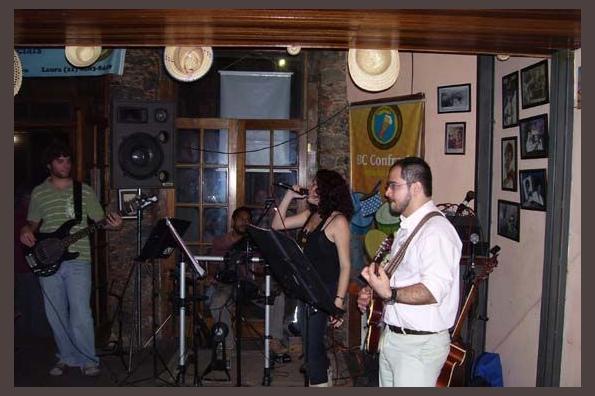 8 Graus
8 Graus
8 Graus: The Argentinian Band that Captivated with "Mar Azul"
Nestled amidst the vibrant cultural landscape of Argentina, emerged 8 Graus, a musical force that left an indelible mark on the Latin American music scene. Their ethereal harmonies and poignant lyrics resonated with countless hearts, propelling them to the forefront of the alternative rock movement.
Members:
* Manuel "Meme" Suares: Vocals, guitar
* Marcelo Moura: Bass, vocals
* Germán Daffunchio: Drums, vocals
* Daniel Melingo: Guitar, vocals (former member)
Origins and Early Challenges:
8 Graus was formed in Buenos Aires in 1984, amidst the turmoil of Argentina's military dictatorship. Undeterred by the oppressive atmosphere, they sought to express their hopes and frustrations through their music. Their early performances in underground clubs were met with both enthusiasm and censorship.
Breakthrough with "Mar Azul":
In 1988, 8 Graus released their debut album, "8 Grados Sobre Cero." The album's centerpiece track, "Mar Azul," became an instant classic. Its haunting melody and poetic lyrics about loss and longing struck a chord with audiences across Argentina and beyond.
Discography and Subsequent Success:
8 Graus went on to release several more successful albums, including "Transpiraciones" (1990), "Paramérica" (1992), and "Iguana" (1994). Their music explored themes of love, pain, and the human condition, earning them widespread critical acclaim.
Controversies and Personal Struggles:
Despite their musical triumphs, 8 Graus faced their share of controversies. In the early 1990s, the band split into two factions over artistic differences. Manuel "Meme" Suares and Marcelo Moura continued as 8 Graus, while Germán Daffunchio formed his own group, Las Pelotas.
Throughout their career, the band members also grappled with personal struggles, including drug addiction and mental health issues. These challenges tested their bond but ultimately served to deepen their music's emotional resonance.
Legacy and Impact:
8 Graus disbanded in 2003 but left an enduring legacy on the Argentinian music scene. Their songs, particularly "Mar Azul," continue to be celebrated as anthems of a generation. The band's influence can be seen in countless contemporary artists, who continue to draw inspiration from their unique blend of alternative rock, poetic lyrics, and emotional authenticity.
Nestled amidst the vibrant cultural landscape of Argentina, emerged 8 Graus, a musical force that left an indelible mark on the Latin American music scene. Their ethereal harmonies and poignant lyrics resonated with countless hearts, propelling them to the forefront of the alternative rock movement.
Members:
* Manuel "Meme" Suares: Vocals, guitar
* Marcelo Moura: Bass, vocals
* Germán Daffunchio: Drums, vocals
* Daniel Melingo: Guitar, vocals (former member)
Origins and Early Challenges:
8 Graus was formed in Buenos Aires in 1984, amidst the turmoil of Argentina's military dictatorship. Undeterred by the oppressive atmosphere, they sought to express their hopes and frustrations through their music. Their early performances in underground clubs were met with both enthusiasm and censorship.
Breakthrough with "Mar Azul":
In 1988, 8 Graus released their debut album, "8 Grados Sobre Cero." The album's centerpiece track, "Mar Azul," became an instant classic. Its haunting melody and poetic lyrics about loss and longing struck a chord with audiences across Argentina and beyond.
Discography and Subsequent Success:
8 Graus went on to release several more successful albums, including "Transpiraciones" (1990), "Paramérica" (1992), and "Iguana" (1994). Their music explored themes of love, pain, and the human condition, earning them widespread critical acclaim.
Controversies and Personal Struggles:
Despite their musical triumphs, 8 Graus faced their share of controversies. In the early 1990s, the band split into two factions over artistic differences. Manuel "Meme" Suares and Marcelo Moura continued as 8 Graus, while Germán Daffunchio formed his own group, Las Pelotas.
Throughout their career, the band members also grappled with personal struggles, including drug addiction and mental health issues. These challenges tested their bond but ultimately served to deepen their music's emotional resonance.
Legacy and Impact:
8 Graus disbanded in 2003 but left an enduring legacy on the Argentinian music scene. Their songs, particularly "Mar Azul," continue to be celebrated as anthems of a generation. The band's influence can be seen in countless contemporary artists, who continue to draw inspiration from their unique blend of alternative rock, poetic lyrics, and emotional authenticity.